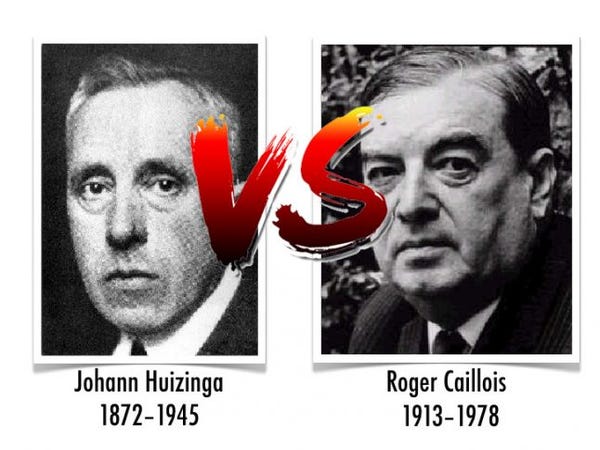
Featured Blog | This community-written post highlights the best of what the game industry has to offer. Read more like it on the Game Developer Blogs or learn how to Submit Your Own Blog Post
How I found a definition of games after searching for 16 years.
Finding a definition for “games” or “play” is a very perilous exercise, but a very important one. This is why despite this topic having been a dead horse for decades, I decided to beat it once more, trying to lay a new brick on the edifice.

Finding a definition for “games” or “play” is a very perilous exercise. First because play as a concept has been around for aeons. So even if I’m unhappy with the definitions that came before, I’m pretty unlikely to find some formula that outwits minds far greater than mine who’ve tried to pinpoint what games are. And second because it’s probably a futile task, dictionaries are printed, minds are made and the dust has probably settled on all battlefield where any debate about the definition of games was had.
But since I started to discover the existence of game studies, I have never really found a definition that “settled it” for me. So here is what I think play, games and sports are and where they come from. Please, feel free to disagree with me courteously in the comments (and if you think this is a pointless endeavour, I agree so no need to tell me :)
edit: this is a translated, re-written and augmented version of an article I originally published on Rue89. The translation process is also an adaptation one, because in french "le jeu" (play) and "un jeu" (a game) are the same word.
Curiosity, an evolutionary tool
The earliest records of a brain structure (as we currently understand it) are 65 million years old. Why do I bring this up? Well it turns out our brains has a variety of structures that support curiosity: we all have impulses to suddenly do absurd things, like hop in a puddle to see what happens, build and destroy sand castles, pull weird faces in the mirror… Just for the heck of it, really.
But our curiosity is also a very useful evolutionary tool: by having these impulses and acting on some of them, by nurturing our desire to explore, it suddenly becomes much easier to understand our own environment, to adapt and to survive.
Pretending is safer
If you had to jump off a cliff to understand gravity, although you might be learning a valuable lesson, you wouldn’t be around anymore to tell everyone… That’s why it’s usually better to experiment with « pretend » situations and simulate the conditions, test the waters. Pile rocks, or throw things to understand gravity, chase your pets and race your friends, play target practice, are probably wise steps to take before deciding to pursue a giant mammoth for dinner.

(Photo : An example of safe and prudent curiosity : at Chicago’s Sears Tower, play with your vertigo)
This ability to recreate on a smaller scale the conditions that we face in our everyday environment is an idea that seems to have been with us for a while. It’s easy to see how curiosity played a hugely important role in our evolution as a species: who do you think will be more physically fit for survival, the creature who won’t stop chasing its peers for fun or the one that sleeps until it’s time to hunt? Muscles are trained by practice. And you might have notice that most animals don’t really “work” out… They play.
Playing to learn or playing for another sake?
So now that we’ve established that play has been a part of us for some time now, let’s talk about its role in the development of children. Some notions require basic understanding before they can be explained and deeply understood much much later (gravity, taste, colors, social habits…). And how does that happen? Through playfulness, which is just exploration and experience recontextualised.
But sadly, although children are deeply intelligent, if you tried to have a conversation with a 4 year old about politics, you might notice that they aren’t really adult-standard intelligent… And this might be a reason why people, throughout the centuries, have equated play, childhood and a waste of time, going as far as to reduce play to a wasteful, child-only activity, underserving of adult attention.
Since antiquity, examples can be found of play restricted to childhood, with notable exceptions :
• Sacred games that allow for randomness and interpretation when sanctioned by priests.
• Gambling which makes games “serious” by removing the innocence of play.
• And of course, sports. Our ancestors probably realised pretty quickly that to become a great runner or a talented warrior, you’d probably be better off training by playing tag or fighting with wooden swords, than reading a book about it. And so some games were ennobled and dubbed “sports”. Basically sports are games that are played for a stake other than their own.
Including Windows XP by accident
When I started thinking about the definition of play and reading up about it in the easy 2000s, my first instinct was to look up the word in the dictionary. The thing with dictionaries though, is that they only inform us of what’s commonly understood about games, but don’t shed light on their nature. So their usual trick is to show a list of cases in which the word appears: playing games, playing a role, playing an instrument… None of which seemed to relate to video games in the least. So I started looking at more serious sources.
The first thing I discovered with shock is that game studies appeared to be relatively new. Vitruve wrote about architecture in 100BC, Aristotle about literature in 335 BC but despite play having been with us for millions of years, games studies didn’t really start before the 1930s (apart from a few mentions here and there).

But the definitions that I could find at the time seemed to me disappointing and encumbered. Johan Huizinga (1872-1945, Dutch) and Roger Caillois (1913-1978, French) the first two modernists to have tackled the issue have longish lists of prerequisites (the game has to be free, unpredictable, nonproductive, useless etc.). This enumeration, although very useful and a very important first step for me intellectually, was mostly about mapping the area games inhabit. Where they fit in society, but did not, again, seem to elucidate some truth about their nature.
After all this reading, I realised that I was strictly trying to define video games, amounting to something along the lines of «An… um… An interactive device which... Is used for amusement. And when you press the buttons, something moves?» But as Mathieu Triclot suggests in his witty introduction to Philosophie du Jeu Vidéo (The Philosophy of Video Games) which consists of a dialogue between Mario and Socrates, the exercise of defining by inclusion / exclusion is pretty pointless, because it’s almost impossible to cover all the various aspects the eerie experiences, the flight simulators, Solitaire, League of Legends, Candy Crush or even choose your own adventure games, by adding or subtracting notions or verbs…
So I was left with a lot of questions. And for 16 years of writing or talking about game design, when asked about the definition of games, I simply recounted the history of efforts to define them, adding Juul, Bogost, Zimmerman, Lantz, Koster and many more to the mix and painting with a common brush a kind of broad understanding that did not satisfy me but to a certain extent, was complex enough to never make me want to go near that subject again.
And then (16 years later) it struck me!
“Play is the fiction of doing”
I can’t tell you how it happened, so if you needed proof that I’m not a genius, here it is on a silver platter: it took me sixteen years to figure out a six word sentence that kind of happened to me by chance. It was the end of the summer, after two months of writers block, it suddenly dawned on me while thinking back on this question of definition.
“Fiction” is the nature of recountings or activities that we engage with, knowing that they are exist under a suspension of the usual rules of reality. We suspend our disbelief, enlist in the experiences and accept them to be lies, fabrications, triggering a special mode in our brain that believes without believing. This is the mode games put us in: you chase the ball (or a Pokemon) as if your life depended on it. You are touched, hurt or enthralled by events as if they were real, but you know they aren’t. Somewhere, in the back of your brain there is a reality switch that you don’t want to touch but that could jumpstart you out of the experience in a split-second. This, this suspended, floating state that one could call “immersion” is fiction; for immersion in water is to gravity what fiction is to reality.
Why is it “the fiction of doing” and not “the fiction of action”? Because games can contain things to do that are rarely considered action : waiting, looking around, doing nothing… But also empathising, reflecting, understanding, all part of play, but no action themselves.
So as a side note here (and to hop back on the walking simulator debate-wagon): yes, waiting, or walking around are things players have to do by the games’ demands. They are part of the play, they are part of what the designer intended for you to go through when they designed the game. Therefore, we can either take the stance that any waiting in any game is exclusionary (and basically expel 99% of games from the field), say that it kinda depends how much walking around or waiting there is to do (which is so relativistic that it makes any definition attempt null and void and is therefore self defeating), or that fiction of doing, any pretend play, any role-taking in which we engage, is play.

And it’s been life changing for me: thinking about play and games as to encapsulate playing theatre, playing music, playing sports and playing video games. All these activities for which I used the word “play” without understanding why. What it actually meant that all those things were play activities, connected in a sense. Play is the fiction of doing: faking a role, putting notes on a sheet because it pleases you when they come out of your guitar, make up a story, make up a character to test the limits of the social world or throw a rock, just to see how far it goes.
But they’re not video play, they’re video games, so what are games?
Well… Games are just play, formalised. A setup of rules to follow in a fictitious state is enough to qualify a game.
…Wait, didn’t we start wanting to know more about video games? What about them?
Not as easy as it might seem
First, you’d think video would come naturally. Video, you know. With a screen. But did you know that there are some video games that are made to be played without using your sight? Papa Sangre for instance, an iphone game that’s played only with sound… Does it fall out of the “video game” category because it doesn’t use video?
Can a video game that you or I play, never be a video game if it’s played by a visually impaired or a blind player? Does it become “just a game” or something else? But the thing that they are playing with hasn’t changed in nature, why should it change in name?
No, really, the “video as screen” lead wasn’t taking me on the right tracks, especially when you start seeing games like “Johann Sebastian Joust”, a modern take on egg racing (which is a game in which you race other people with an egg in a spoon trying to win the race and not break your egg). JS Joust uses a computer, Playstation move controllers (or Wiimotes in a previous version), but no screen… So is it a video game?
A tour of ALT+CTRL+GDC will probably persuade you that there exists hundreds of games that are coded and made and through of by the same people that design more classic “video” games.
Truthfully, the common denominator between these varied forms is the use of a computer that does part of the job for us. Sometimes, it does things we could do manually (like stacking decks of cards or throwing dice in computer versions of Monopoly). But other times, it does things we couldn’t even dream of doing manually (spaceship battles on huge scales in fantastic landscapes).
So in all these cases, what does the computer do that we don’t? It counts, it takes our actions and transcribes them into numbers and transforms that into movements on a screen, or into sounds or even vibrations. It computes (from the latin verb “computare”: to count).
A video game is therefore a formalised fiction of doing (a game) that requires computing: an autonomous calculation. That’s what a video game means today. When GDC is a “video game convention” this is what the term covers.
I strive for elegance in my job as a game designer and I want that definition to be useful to you. It sure has been for me.
I think it’s in the “Vagabond” manga that a character says : “The greatest painters look at a flower for years, pondering its beauty, and then, in a single stroke they capture its elegance”. I am not a great painter, but I think this definition captures the essence of what games are in very few words.
That’s why I wanted to share this discovery, these six words that I found recently and that I have been using almost daily ever since. I hope you like them, and the next time the subject comes up, you can answer: «Games are art, just like painting or photography is the art of giving to see, music is the art of giving to hear and games are the art of making people do.»
Read more about:
Featured BlogsAbout the Author(s)
You May Also Like







.jpeg?width=700&auto=webp&quality=80&disable=upscale)








